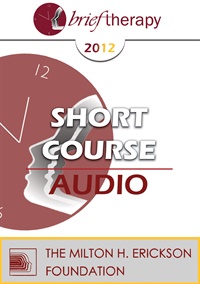
- Average Rating:
- Not yet rated
- Topic Areas:
- Short Courses | Borderline | Brief Therapy
- Categories:
- Brief Therapy Conference | Brief Therapy Conference 2012
- Faculty:
- John Lentz, D. Min.
- Duration:
- 1:29:05
- Format:
- Audio Only
- Original Program Date:
- Dec 09, 2012
- Short Description:
- BT12 Short Course 36 – New Perspectives and Healing for Borderlines: A Brief Therapy Intervention for Lasting Change – John Lentz, DMin This radical new approach for Borderline Personality Disorder utilizes strength based approaches that work, are respectful and brief. Combining clinical practice, communication theory and hypnotic principles this approach helps Borderlines feel safe and respected, while they change. Utilizing Borderline intuition, and insight it offers a way for them to gently alter their interpretations so that they can relate effectively and safely. You will like your new skills. This workshop comes from the author’s newest book.
- Price:
- $15.00 - Base Price
Tags: Borderline
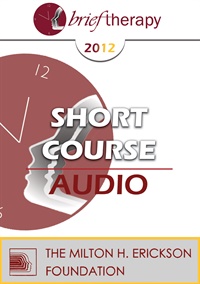
- Average Rating:
- Not yet rated
- Topic Areas:
- Animal Assisted Therapy | Psychotherapy | Short Courses | Metaphors | Brief Therapy
- Categories:
- Brief Therapy Conference | Brief Therapy Conference 2012
- Faculty:
- Dale Klein-Kennedy, LPCC | Karen Wall
- Duration:
- 1:07:50
- Format:
- Audio Only
- Original Program Date:
- Dec 09, 2012
- Short Description:
- Animal metaphors are used as a part of our everyday vocabulary describing relationships, personal characteristics, etc. Metaphor in the presence of the work with the animal takes on a new and deeper meaning. This presentation will demonstrate the powerful use of animals and animal metaphors in brief psychotherapy. Through examples and discussion of the work, attendees will develop an understanding of ATT (animal-assisted therapy) and will participate in a live demonstration of AAT.
- Price:
- $15.00 - Base Price
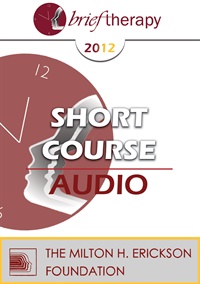
- Average Rating:
- Not yet rated
- Topic Areas:
- Short Courses | Multicultural | Therapist Development
- Categories:
- Brief Therapy Conference | Brief Therapy Conference 2012
- Faculty:
- Bob Bertolino, PhD
- Duration:
- 1:26:07
- Format:
- Audio Only
- Original Program Date:
- Dec 09, 2012
- Short Description:
- Some agencies consistently achieve better clinical outcomes. The benefits of higher-performing agencies include greater accountability, improved resource management, briefer treatment duration, decreased client dropout, and increased staff retention. Participants in this workshop will first learn about key research findings that form the building blocks of sustainable “cultures of excellence.” Next, specific strategies including brief and time -sensitive interventions, client feedback, and monitoring of individual and program outcomes will be described.
- Price:
- $15.00 - Base Price
Tags: Therapist Development
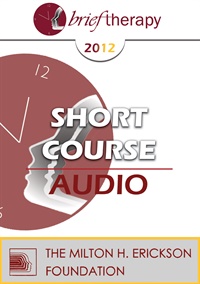
- Average Rating:
- Not yet rated
- Topic Areas:
- Short Courses
- Categories:
- Brief Therapy Conference | Brief Therapy Conference 2012
- Faculty:
- Deborah Beckman
- Duration:
- 1:31:07
- Format:
- Audio Only
- Original Program Date:
- Dec 09, 2012
- Short Description:
- BT12 Short Course 39 – Nightly Napping is Not Enough – Deborah Beckman, MS Late night commercials promise to recapture a full night’s sleep. Still, we’re chronically sleep deprived, catching little more than midnight naps. Chasing “whys” distracts and delays reestablishing healthy sleep. Rebuilding the how-to’s of healthy sleep is crucial to reestablishing resilience. This protocol goes beyond good sleep hygiene and gadgets by prioritizing the physiology of sleep with components of clients’ presenting complaint(s). Clinical demonstration, case applications and discussion provide opportunities to develop specific interventions.
- Price:
- $15.00 - Base Price
Tags: Insomnia
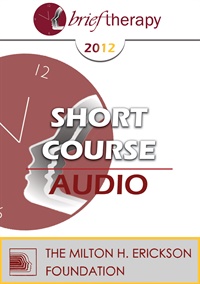
- Average Rating:
- Not yet rated
- Topic Areas:
- Psychotherapy | Children and Adolescent Therapy | Short Courses
- Categories:
- Brief Therapy Conference | Brief Therapy Conference 2012
- Faculty:
- Maria Escalante de Smith, MA
- Duration:
- 1:14:40
- Format:
- Audio Only
- Original Program Date:
- Dec 09, 2012
- Short Description:
- BT12 Short Course 40 – Brief Psychotherapy for Children and Adolescents Facing Serious Situations – Maria Escalante de Smith, MA When children and teenagers face serious problems they experience a variety of feelings and emotions. Brief Therapy techniques can help them find solutions and explore new alternatives within a short time. Short interventions, such as brief trances and conversational hypnosis will be demonstrated. Utilization of individual’s resources, likes, and favorite activities will also be discussed as brief therapy tools will be used during therapy. Participants will be able to explore how other approaches such as Narrative Therapy can enhance and embellish Ericksonian approaches.
- Price:
- $15.00 - Base Price
Tags: Children Psychotherapy Adolescents
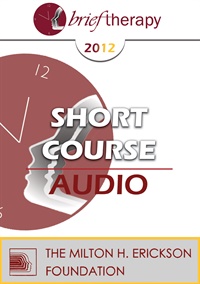
- Average Rating:
- Not yet rated
- Topic Areas:
- Short Courses | Communication | Multicultural
- Categories:
- Brief Therapy Conference | Brief Therapy Conference 2012
- Faculty:
- Sherri Reynolds
- Duration:
- 1:34:45
- Format:
- Audio Only
- Original Program Date:
- Dec 09, 2012
- Short Description:
- BT12 Short Course 41 – How Culture Impacts Communication – Sherri Reynolds, MA, MFT Participants will identify and analyze culture using 10 dimensions to break through communication barriers. Participants will learn to assess their own and their clients’ cultural styles of communication. Participants will also learn to apply specific techniques to facilitate more effective communication with clients, allowing them to establish lasting trust and develop a deeper relationship with clients from diverse cultures.
- Price:
- $15.00 - Base Price
Tags: Multi-Cultural
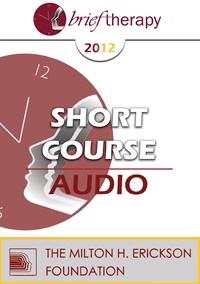
- Average Rating:
- Not yet rated
- Topic Areas:
- Hypnotherapy | Emotionally Focused Therapy (EFT) | Short Courses | Pain and Healing
- Categories:
- Brief Therapy Conference | Brief Therapy Conference 2012
- Faculty:
- Jeffrey Feldman, PhD
- Duration:
- 1:16:24
- Format:
- Audio Only
- Original Program Date:
- Dec 09, 2012
- Short Description:
- BT12 Short Course 42 – Emotion- Focused Hypnotherapy for Coping with Pain – Jeffrey Feldman, PhD This short course will introduce a treatment approach that targets the affective dimension of pain. The emotion specific wording and elicitation of positive state dependent learning can be used in a brief therapy approach whether or not patients’ feelings of anger, sadness, or anxiety are associated with physical pain.
- Price:
- $15.00 - Base Price
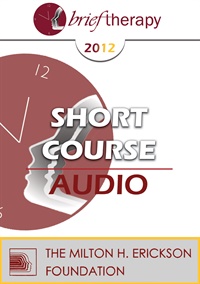
- Average Rating:
- Not yet rated
- Topic Areas:
- Short Courses
- Categories:
- Brief Therapy Conference | Brief Therapy Conference 2012
- Faculty:
- Joseph Dowling, MS, LPC
- Duration:
- 55:17
- Format:
- Audio Only
- Original Program Date:
- Dec 09, 2012
- Short Description:
- BT12 Short Course 43 – How to Become Smart Enough to Know When to Stop Thinking: A Brief Ericksonian Approach to Lasting Solutions – Joseph Dowling MS, LPC Milton H. Erickson, MD, understood that “the conscious (thinking) mind doesn’t do much of anything of much significance…while the unconscious mind is an infinite storehouse of dreams, potentials, and solutions…” This workshop will teach a brief, solution-focused, strategic, and hypnotic approach to anxiety-related disorders. Intellectualizing, analyzing, self-criticizing, WHY-ing and WHAT-IF-ing clients will be targeted as participants learn to employ Ericksonian interventions including solution-focused questions, strategic task assignments, and formal/ conversational hypnosis via live demonstration, experiential exercise, and case studies.
- Price:
- $15.00 - Base Price
Tags: Unconscious Processes
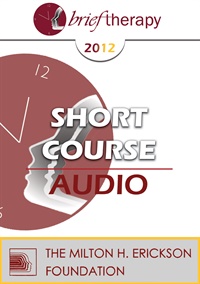
- Average Rating:
- Not yet rated
- Topic Areas:
- Hypnosis | Short Courses | Metaphors | Brief Therapy
- Categories:
- Brief Therapy Conference | Brief Therapy Conference 2012
- Faculty:
- Bette Freedson, MSW
- Duration:
- 1:14:37
- Format:
- Audio Only
- Original Program Date:
- Dec 09, 2012
- Short Description:
- Therapists working with single mothers often hear stories of abandonment, disempowerment, loneliness, hopelessness, victimization, rage and unrelenting stress. Disturbing perceptions and emotions such as these, and the distorted interpretations that result, may rigidify into psychic schemas comprised of patterns of dysfunctional reacting and compromised coping. Identifying negative schemas, and harnessing the mind’s powerful potential to transform them, will be the dual focus of this course. Participants will explore the way in which the quiet mind, combined with the evocative and rhythmic language of hypnosis, can fuel a subconscious shift from confusion to clarity. Participants will experience the way in which sympathetic identification with transformed metaphors, drawn from the substance of personal stories, can fuel an alchemical shift that decreases stress, increases ego strength, and paves the way to inner peace.
- Price:
- $15.00 - Base Price
Tags: Hypnosis Brief Therapy Metaphors

- Average Rating:
- Not yet rated
- Topic Areas:
- Short Courses
- Categories:
- Brief Therapy Conference | Brief Therapy Conference 2012
- Faculty:
- Dale Bertram, PhD | Mike Rankin, MA
- Duration:
- 1:23:09
- Format:
- Audio Only
- Original Program Date:
- Dec 09, 2012
- Short Description:
- BT12 Short Course 45 – Ericksonian Principles for Helping Stepfamilies Blend – Dale Bertram, PhD and Michael Rankin, MA, LMFT By using Ericksonian Methods of utilizing resistance, working with dissociation, and altering its consciousness, we can help a step-family to change its trance and the family can become a true blended family. Step-families can learn to play together, work together, and support one another.
- Price:
- $15.00 - Base Price
Tags: Consciousness Trance
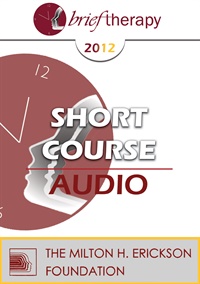
- Average Rating:
- Not yet rated
- Topic Areas:
- Short Courses
- Categories:
- Brief Therapy Conference | Brief Therapy Conference 2012
- Faculty:
- Lindasue Marshall, LCSW
- Duration:
- 1:21:56
- Format:
- Audio Only
- Original Program Date:
- Dec 09, 2012
- Short Description:
- BT12 Short Course 46 – Brief Therapy for the Final Stages of Life – Lindasue Marshall, MSW Brief therapy principals and methods that assess how the patient sees the problem, their beliefs and values about life and death, then intervene with tasks, reframing, and metaphor can provide rapid lasting transformation for patients with terminal illness. The therapist’s ability to help deal both directly and indirectly with the last stages of life can help terminal patients move from a fear based position to live meaningful final chapters of their lives.
- Price:
- $15.00 - Base Price
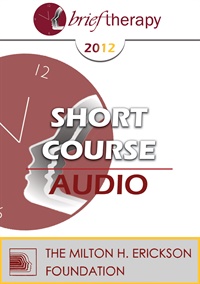
- Average Rating:
- Not yet rated
- Topic Areas:
- Trance | Neuroscience | Psychotherapy | Short Courses
- Categories:
- Brief Therapy Conference | Brief Therapy Conference 2012
- Faculty:
- Susan Pinco, PhD
- Duration:
- 1:13:42
- Format:
- Audio Only
- Original Program Date:
- Dec 09, 2012
- Short Description:
- BT12 Short Course 47 – Is it the Talking that Cures? An Exploration of the Role of Silence and Words in the Clinical Encounter – Susan Pinco, PhD Explore the role that silence plays in the hypnotic and clinical process. Our journey will begin with a discussion of structured and unstructured silence, how both are manifested, and potentially utilized. It continues with an overview of research related to silence in psychotherapy as well as findings in neuroscience that help explain why silence is a key ingredient in effective trance-formational processes. Attendees will engage in exercises that are designed to expand their awareness of the pivotal role that silence plays in healing and in so doing facilitate the conscious development of strategic interventions that utilize silence hypnotically to address a wide range of clinical issues.
- Price:
- $15.00 - Base Price
Tags: Neuroscience Psychotherapy Trance
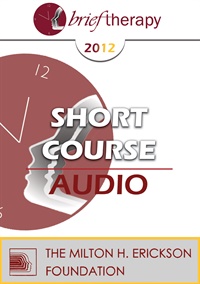
- Average Rating:
- Not yet rated
- Topic Areas:
- Psychology | Short Courses
- Categories:
- Brief Therapy Conference | Brief Therapy Conference 2012
- Faculty:
- Fabio Leonardi | Gerry Grassi
- Duration:
- 1:05:15
- Format:
- Audio Only
- Original Program Date:
- Dec 09, 2012
- Short Description:
- BT12 Short Course 48 – Changing Individual Systems in Order to Obtain Lasting Solutions: Three Brief Strategic Techniques – Fabio Leonardi, Psychology, and Gerry Grassi, Psychology Lasting solutions imply a second order change, which is a change of one’s own identity system. Basing on strategic- constructivist tradition, we developed three techniques. The first one aims to re-frame identity systems characterized by feelings of inadequacy and social inhibition. The second one aims to change identity systems characterized by feelings of victimization. The third one is used with subjects who feels dependent on others.
- Price:
- $15.00 - Base Price
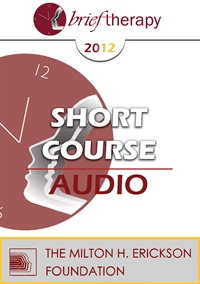
- Average Rating:
- Not yet rated
- Topic Areas:
- Psychotherapy | Short Courses
- Categories:
- Brief Therapy Conference | Brief Therapy Conference 2012
- Faculty:
- Roxanna Erickson Klein, RN, PhD, LPC, LCDC | Pennie Johnson
- Duration:
- 1:42:53
- Format:
- Audio Only
- Original Program Date:
- Dec 09, 2012
- Short Description:
- BT12 Short Course 49 – Milton Erickson and Patrick Carnes: Comparing and Contrasting the Work of Two Leaders – Roxanna Erickson-Klein, PhD, and Pennie Johnson, MA This course will look at the work of two charismatic leaders, each of who made a substantial impact to psychotherapy practiced today. Commonalities and differences will be explored, and the relevance of their work will be discussed. Ideology, strategies, and principles of treatment will be compared and contrasted.
- Price:
- $15.00 - Base Price
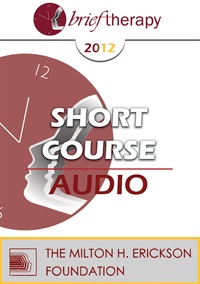
- Average Rating:
- Not yet rated
- Topic Areas:
- Short Courses
- Categories:
- Brief Therapy Conference | Brief Therapy Conference 2012
- Faculty:
- Cheryl Bell-Gadsby, M.A., R.C.C. | Kathleen Donaghy
- Duration:
- 1:54:04
- Format:
- Audio Only
- Original Program Date:
- Dec 09, 2012
- Short Description:
- BT12 Short Course 50 – Pattern Disruption Right Out of the Gate – Cheryl Bell-Gadsby, MA, RCC, and Kathleen Donaghy, PhD, PC This session will demonstrate the efficient and strategic use of energy and trancework in shifting clients’’ resistance into movement and resolution of conflict. Case examples will be provided to illustrate application of our approach with a couple, a mother and daughter, and with adolescent girls. We will conclude with a demonstration and discussion.
- Price:
- $15.00 - Base Price
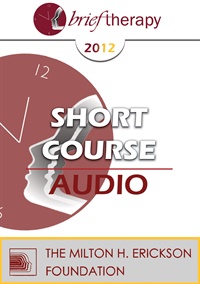
- Average Rating:
- Not yet rated
- Topic Areas:
- Anxiety | Depression | Short Courses | Communication | Neurobiology
- Categories:
- Brief Therapy Conference | Brief Therapy Conference 2012
- Faculty:
- Bart Walsh, MSW
- Duration:
- 1:55:20
- Format:
- Audio Only
- Original Program Date:
- Dec 09, 2012
- Short Description:
- BT12 Short Course 51 – Effective Management of Chronic Anxiety and Depression with Essential Neurobiological Communication – Bart Walsh, MSW Learn how to access deep levels of mind-body functioning for remission of chronic anxiety and depression. Essential neurobiological communication (ENBC) incorporates a form of body language known as ideomotor signaling. Affected individuals learn to fully manage these chronic conditions. Resolve past emotion using a noninvasive protocol integrating a progressive ratification sequence for grounding emotional adjustments in thought, perception and behavior.
- Price:
- $15.00 - Base Price
Tags: Anxiety Depression
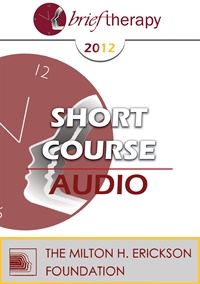
- Average Rating:
- Not yet rated
- Topic Areas:
- Short Courses
- Categories:
- Brief Therapy Conference | Brief Therapy Conference 2012
- Faculty:
- Helen Adrienne, LCSW, BCD
- Duration:
- 1:56:31
- Format:
- Audio Only
- Original Program Date:
- Dec 09, 2012
- Short Description:
- BT12 Short Course 53 – What to Expect When Your Patient is Not Expecting – Helen Adrienne, LCSW The number of those who are struggling with infertility in the United States is 7.3 million and growing. If you have not yet encountered this in your practice, you are likely to sooner or later. Working effectively with this highly stressed population requires awareness of the unique profile of patients suffering with the unmet longing for a baby. This workshop will be an opportunity for you to gather the understanding you need in order to attune yourself to the challenges these men, women and couples face and to learn brief therapy, mind/body interventions that will make a difference
- Price:
- $15.00 - Base Price
Tags: Mind-Body
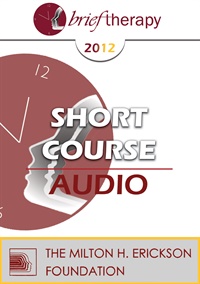
- Average Rating:
- Not yet rated
- Topic Areas:
- Short Courses | Love
- Categories:
- Brief Therapy Conference | Brief Therapy Conference 2012
- Faculty:
- Michael Munion, MA, LPC
- Duration:
- 2:04:23
- Format:
- Audio Only
- Original Program Date:
- Dec 09, 2012
- Short Description:
- BT12 Short Course 54 – Love and Intention: Improving Strategic Outcomes – Michael Munion, MA This workshop provides a framework for assessing clients along two important dimensions that impact therapeutic outcome: motivation and sense of agency (one’s perception of their ability to create change in their own lives). This assessment fosters interventions that enhance the capacity for strategic interventions to be truly brief and solution focused. The participants in this workshop will have the opportunity to observe and practice this approach.
- Price:
- $15.00 - Base Price
Tags: Love
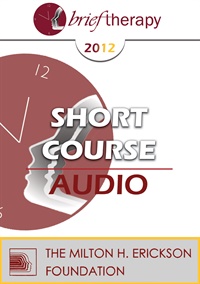
- Average Rating:
- Not yet rated
- Topic Areas:
- Short Courses
- Categories:
- Brief Therapy Conference | Brief Therapy Conference 2012
- Faculty:
- Sheldon Cohen, MD
- Duration:
- 1:54:23
- Format:
- Audio Only
- Original Program Date:
- Dec 09, 2012
- Short Description:
- BT12 Short Course 55 – Keeping Nature in Ericksonian Therapy – Sheldon Cohen, MD The theme of nature/environment appears repeated in Erickson’s lectures, writings, and recollections of those who know him. This presentation will enhance our appreciation of the importance of nature in therapy and enhance our ability to impart the concept to patients. The author will share the techniques, conscious and unconscious, that he uses with patients. Attendees will do likewise.
- Price:
- $15.00 - Base Price
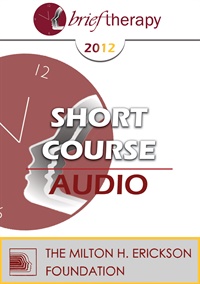
- Average Rating:
- Not yet rated
- Topic Areas:
- Short Courses | Brief Therapy | Footprinting | Relationships
- Categories:
- Brief Therapy Conference | Brief Therapy Conference 2012
- Faculty:
- Susan Dowell, MSW
- Duration:
- 1:03:35
- Format:
- Audio Only
- Original Program Date:
- Dec 09, 2012
- Short Description:
- Footprintings is a new three dimensional treatment model. In this work, nine different color sets of Footprintings become tools for a patient to bookmark, diagram, track and explore internal experience and shifting states of consciousness, as they are experienced in the Present Moment. When a patient chooses color Footprintings to represent an aspect of self-experience, positions these Footprintings on the ground and then stands in them, the postural shifts , body experience, and shifting perspectives and associations unfolding from this positioning can lead to valuable insights, learning opportunities and new perspectives.
- Price:
- $15.00 - Base Price

- Average Rating:
- Not yet rated
- Topic Areas:
- Children and Adolescent Therapy | StoryPlay | Trauma | Short Courses | Storytelling | Indirection | Experiential Therapy
- Categories:
- Brief Therapy Conference | Brief Therapy Conference 2012
- Faculty:
- Joyce Mills, PhD, LMFT
- Duration:
- 1:42:26
- Format:
- Audio Only
- Original Program Date:
- Dec 09, 2012
- Short Description:
- This experiential workshop will present an essential element of StoryPlay®, an Ericksonian, resiliency-based, indirective process of Play Therapy that focuses upon how to identify, access and utilize inner resources, skills, and gifts as invaluable “gems” to move us beyond diagnosis and effect transformational change for children and adolescents who have experienced trauma and adversity.
- Price:
- $15.00 - Base Price
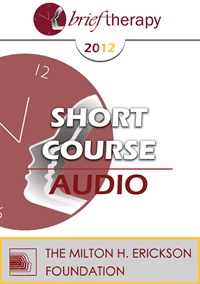
- Average Rating:
- Not yet rated
- Topic Areas:
- Short Courses | Single-Session | Therapist Development
- Categories:
- Brief Therapy Conference | Brief Therapy Conference 2012
- Faculty:
- Arnold Slive, PhD
- Duration:
- 1:18:23
- Format:
- Audio Only
- Original Program Date:
- Dec 09, 2012
- Short Description:
- Walk-in counseling services allow clients to attend a session of therapy without waiting for an appointment. Many are seen for only one session. Research consistently indicates that “one” is the modal number of sessions for all models of therapy and that single sessions are highly effective. This workshop describes therapy, research, strategies, and techniques for making single sessions, whether planned or not, as effective as possible. Emphasis will be on the application of these principles in a variety of walk-in services.
- Price:
- $15.00 - Base Price
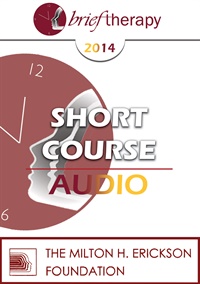
- Average Rating:
- Not yet rated
- Topic Areas:
- Short Courses | Experiential Therapy | Brief Therapy | Meditation, Spirituality and Yoga | Mindfulness
- Categories:
- Brief Therapy Conference | Brief Therapy Conference 2014
- Faculty:
- Susan Pinco, PhD
- Duration:
- 1:34:55
- Format:
- Audio Only
- Original Program Date:
- Dec 11, 2014
- Short Description:
- This experiential seminar will lead attendees in an exploration of mindful silence and its role in the clinical encounter. Our journey will begin with a taste of both structured and unstructured silence followed by a discussion of how both are manifested, experienced, and potentially utilized in the clinical encounter. Research related to silence in psychotherapy and recent findings in neuroscience will help explain why silence is a key ingredient in effective transformational processes.
- Price:
- $15.00 - Base Price
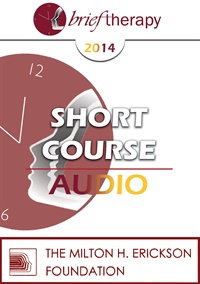
- Average Rating:
- Not yet rated
- Topic Areas:
- Ericksonian Psychotherapy | Psychotherapy | Trauma | Short Courses | Children and Adolescent Therapy | Pain and Healing | Brief Therapy | Ericksonian Hypnosis and Therapy Techniques
- Categories:
- Brief Therapy Conference | Brief Therapy Conference 2014
- Faculty:
- Maria Escalante de Smith, MA
- Duration:
- 1:09:29
- Format:
- Audio Only
- Original Program Date:
- Dec 11, 2014
- Short Description:
- When children experience painful emotions and anxiety after going through traumatic events they may not be able to understand what is happening to them and thus get depressed. Other consequences may appear, like lack of concentration or academic problems. Attendants will learn how treat these conditions by using brief Ericksonian techniques, assignments, and toys and by including the family members during therapy.
- Price:
- $15.00 - Base Price
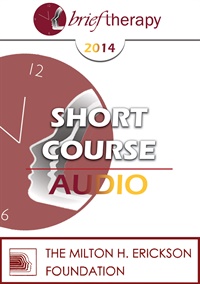
- Average Rating:
- Not yet rated
- Topic Areas:
- Consciousness | Trauma | Sex and Sexuality | Short Courses | Meditation, Spirituality and Yoga | Family Constellations | Experiential Therapy
- Categories:
- Brief Therapy Conference | Brief Therapy Conference 2014
- Faculty:
- Emily Volden, MSW, LICSW | Dan Booth Cohen, PhD
- Duration:
- 1:26:22
- Format:
- Audio Only
- Original Program Date:
- Dec 11, 2014
- Short Description:
- Family Constellations can be used in therapy as a process for treating sexual trauma. The experiential process accesses the heart as an organ of perception to explore, heal, and release sexual trauma while reclaiming clients’ empowered sexual selves. Employing a light meditation, therapist and client open the doors of awareness to ancestral and archetypal consciousness.
- Price:
- $15.00 - Base Price

